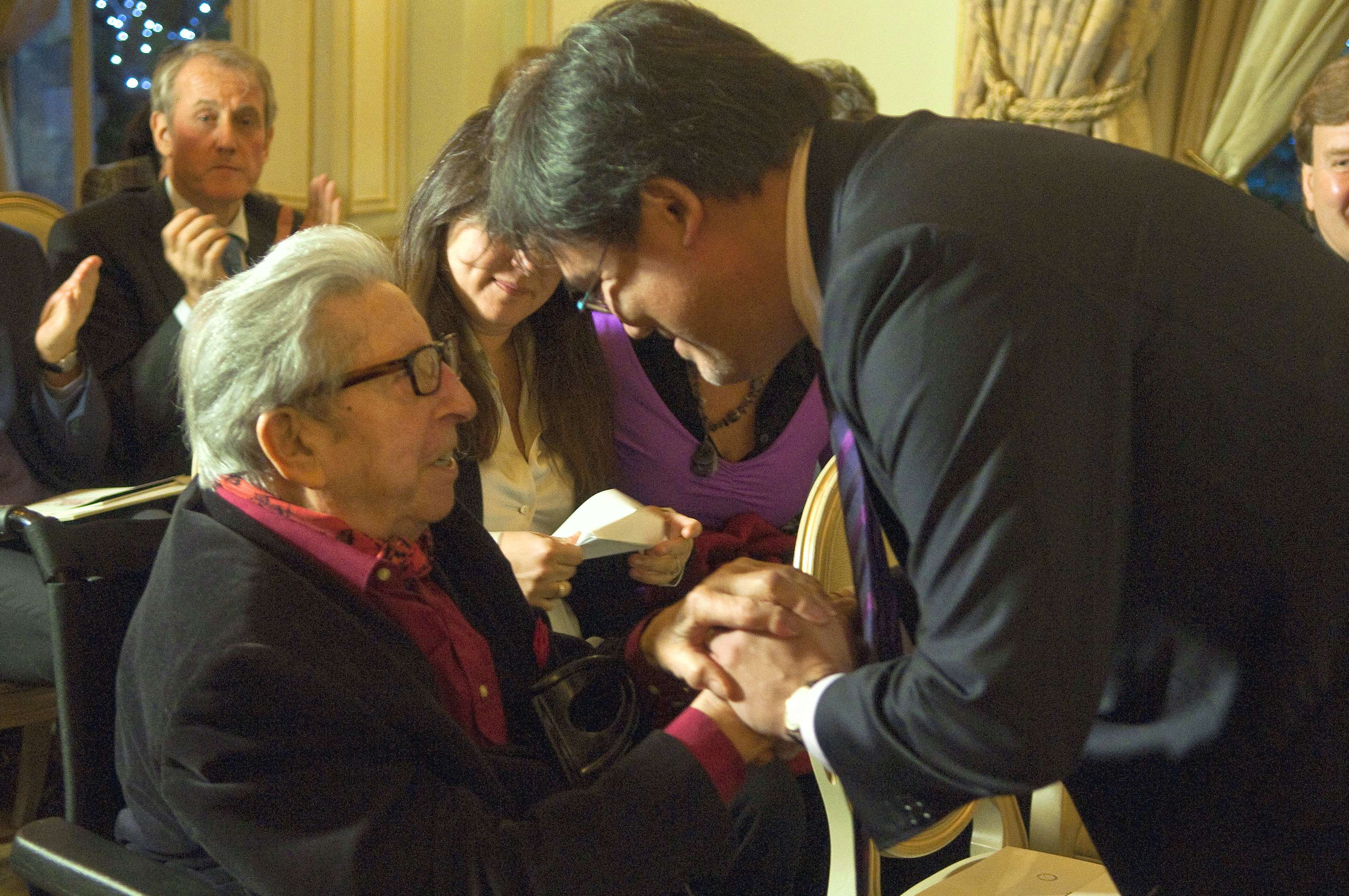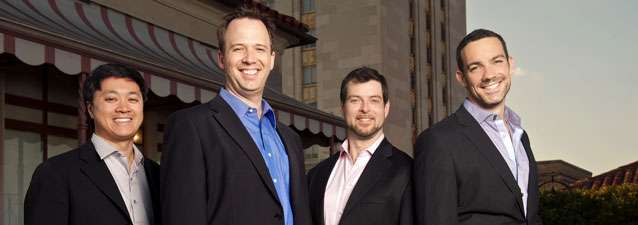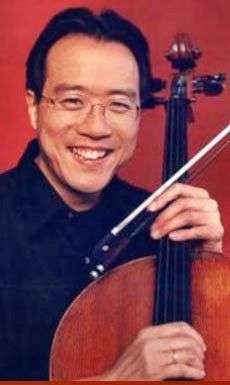|
Back
A Universe of Sound New York
Avery Fisher Hall, Lincoln Center
06/26/2012 -
Henri Dutilleux: Métaboles – String Quartet: Ainsi la Nuit – Cello Concerto: Tout un monde lointain
Yo-Yo Ma (Cello), Miró Quartet: Daniel Ching, William Fedkenheuer (Violins), John Largess (Viola), Joshua Gindele (Cello)
New York Philharmonic Orchestra, Alan Gilbert (Conductor)

H. Dutilleux, A. Gilbert (© Alvaro Yanez)
If this Friday’s Philharmonic Concert of Boulez, Stockhausen and Ives, promises to have the intensity of a Black Hole, last night’s concert, devoted entirely to the work of Henri Dutilleux had the radiance of a crystalline cosmos.
This is no hyperbole. Henri Dutilleux can only be compared to a composer in hyperspace. Like Berlioz and Szymanowski, he is of his time (the last half of the 20th Century), but transported to a dimension not quite in his time. His care and elegance in orchestration could be compared to Messiaen, even Debussy, but his elegance is less that of a composer than a physicist.
One might follow some structural explanations for his music, but instructions quickly vaporize into a near-haptic world of spirituality, memory, the poetry of the French Symbolists, and a non-voluptuous sensuality.
But this was our luxury of sitting in the audience in Avery Fisher Hall, for a program without intermission, the devotion to a single composer becoming a celebration. (See CODA below). Hearing Dutilleux live is not entirely a rarity, since Alan Gilbert conducted the Métaboles several years ago. But hearing three works together was transportation to a world balancing equally on the rarefied and the dangerous. And because this was Dutilleux, a composer of utmost precision, that balance was not at all difficult.
It certainly wasn’t difficult–for us in the audience–listening to the Métaboles. For the players, even for the Phil, it could have had real terrors.
This is basically a concerto for the full orchestra, and the New York Philharmonic is no slouch when it comes to any music. But Dutilleux here painted his canvas not only with solo runs resembling Le Sacre, but each tiny exclamation or interjection had be part of an enormous orchestral design. Mr. Gilbert is not the kind of conductor who has to point out a 12-note solo for double bass at “Obsessionnel”, or a chord with trombones and tuba at the lowest end. Because the edginess of the whole orchestra envelops those solos and exotic chords.
The paradox of Henri Dutilleux is that he has the most outrageous orchestral moments, but they seem so natural that we don’t have time to think about them. We want to continue the journey. As I recall, the last time Mr. Gilbert conducted this, the “Flamboyant” finale was a bit extra-showy. Last night, Mr. Gilbert made the final movement seem not only dashing, wild, emotional, but it seemed inevitable.
This was gorgeous playing. And going along with the ceremonial aspect, the orchestra disappeared, four seats came on stage, the auditorium lights came on full force–to bond us with the players?–and the Miró Quartet came on to present another strangely titled work.

Miró Quartet (© Courtesy of the artists)
”Thus the night” I heard for the first time, and the titles of the seven movements–various combinations of “litanies” and ‘parentheses” were gobbledygook. But the playing was a gutsy, and the whole fabric, with its gorgeous chords and crescendos, was hypnotic. No doubt I missed some of the variations, the alterations, the subtle changes. But no regrets at all. The colors were of Ravel, the harmonic twists and turns were Bartók. But the whole was Dutilleux, music one could imagine sung by odalisques in 18th Century French North Africa.

Y.-Y. Ma (© New York Philharmonic)
Outside Avery Fisher Hall, the ticket sharks weren’t shouting “Get your Dutilleux tickets!!”. They were shouting “Yo-You Ma!! Yo-Yo Ma!” That was understandable, I guess, but gave no hint of the final work.
I used to think Ligeti’s Cello Concerto had to be the most difficult ever written. But hearing and seeing Mr. Ma essaying virtually every second of the half-hour work was an astonishment.
Though Dutilleux gave contradictory words about the Baudelaire poem which inspired him (“A Whole Remote World”), the Phil took the poem as a signpost. Before the music, it was read beautifully in French, with translation on the screen. With each movement, the first lines of the poem were re-flashed on that back screen.
Initially this was distracting, but Baudelaire was no more literal with words than Dutilleux with notes, and one easily felt comfortable with this mysterious, sometimes soft (never tranquil), sometimes violent (but never vicious) piece. It had been written for Rostropovich, but Yo-Yo Ma has long graduated from the sheer beauty of his younger days, and offered Rostropovich-style mystery, muscularity and meaning to a concert which may easily be one of the most memorable–and revelatory–of this entire season
CODA: This concert was a celebration indeed, for the first Marie-Josée Kravis Prize for New Music. The prize, of $200,000 and a commission, will be given every two years, the odd years given to commissioning younger newer composers.
Such stipends are impressive, I suppose, but the panel which chose Mr. Dutilleux this year was priceless. consisting of Alan Gilbert, Emanuel Ax, Magnus Lindberg, Midori and Dawn Upshaw, among others. Mr. Dutilleux shared his prize with two younger American composers who were in the audience last night. Henry Kravis, who gave this money, sat in the highest balcony. But his creation last night should have elevated him to the Dutilleux cosmos itself.
Harry Rolnick
|